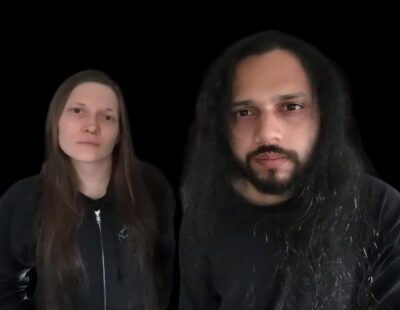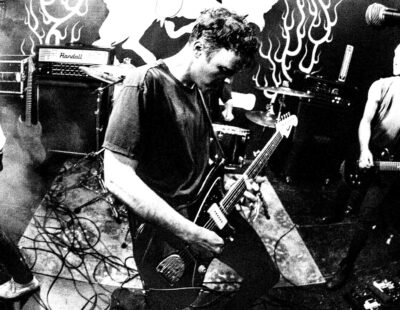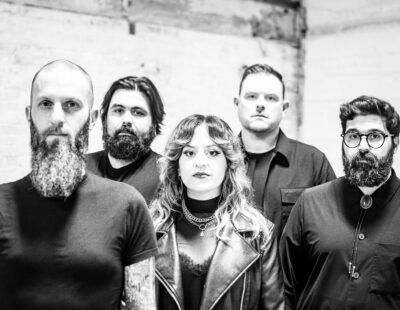Encoffination do well to sound like they’ve been in the ground long before recording. A two-piece, drummer/duo located on opposite sides of the coast in Atlanta and San Diego respectively, their interpretation of death metal is begrudging of tempo and chokes the throat and nostrils with a real cloying miasmatic aesthetic. Guitarist/vocalist Ghoat insists it’s all about death, all of it, sound and ethos. You can read more about the making of sophomore record O’ Hell, Shine in thy Whited Sepulchres by picking up this issue here, but aside from the writing process Ghoat talked about his day job, working in the funeral business and how it has informed his perspective on Encoffination’s subject matter. Far from being a gross-out sick dude, his first-hand experience of death is something that, as he says, makes him feel more human.
Encoffination sound way more abstract than most death metal; what is the philosophy behind your sound?
Ghoat: I play the same kind of riffs that we play in Father Befouled, which is a much more technical death metal band that I’m in; it’s similar but it’s all kind of slowed down and I just don’t want it to be the same nonsense that other people play. I want it to be new for the listener; I don’t want to be re-hashing old ideas. But, I want it to be something unique, without it being like, “Hey, we’re doing something different—look at us!” Me and the drummer both play in Father Befouled, and Father Befouled sound just like Incantation, and we caught flack for that because we sound just like Incantation but that was the point. That’s one of my absolute favourite bands so I wanted to make music like that. But then, with Encoffination, I wanted to write music that sounds like nobody else.
What sort of headspace do you need to be in to write for Encoffination?
Ghoat: I gotta be alone; it’s gotta be quiet. I’ve got to have time to think and write, and the thing about Encoffination is that there’s not any outside influences; I don’t go out and listen to Band A and think, ‘I wanna write riffs like that’, or listen to Band B and think, ‘I wanna do vocals like that’. I don’t want any outside influences creeping in. It’s just Encoffination. I give the drummer the [instruction]: “Don’t make it too fast; don’t make it too slow.” There’s no blasting on any of it. It never picks up any real speed but it’s not just doom the whole time. That’s how we work, I guess.
The guitar tone is horrible, in a good way; do you obsess over old analog equipment?
Ghoat: I mean, the amplifier I record with is 25 years old but we are not trying to say, “Hey, we’re doing this old-school”, we’re doing what we’re doing and this is how it sounds. It’s easier to make it sound this way; we pretty much record what we record, put it out and that’s how it sounds. I mean, I’m not spending a lot of money on it. There’s not a lot of mastering and mixing involved. It’s just that we want it to sound murky and abysmal—that’s what death is.
You played live once and recorded it, will Encoffination play more shows in the future?
Ghoat: That’s the only time we’ve ever played. We’ve only played live once, and I don’t know if we will again.
How did you get into the funeral business?
Ghoat: At high school, I was going to leave and become a funeral director, and I ended up not doing it. 10, 12 years later, I decided that’s what I wanted to do. It doesn’t have anything to do with death metal or the things that I’m into; it’s just the career path I wanted to take, and I’m comfortable with death. I’m comfortable with grief: my job is not just dealing with dead bodies all day—and I do, I’m around dead bodies every single day—but it’s dealing with family members, and there’s a business side to what we do. It’s interesting, from working with prepping bodies, embalming bodies, there’s a fascination with how the system works, and how fragile the human body is. The pathology surrounding why somebody dies, we see all of that, and once it comes to us they’re gone. After they’ve had hospice care; after they’ve been treated for a disease, after everything that’s been done for them we’re the last people to take care of them, and we kinda put them back together and make them look presentable. I know that’s kinda the antithesis to what death metal is; death metal is about gore and destruction, and morbidity; Encoffination is the opposite of that. Encoffination is the theory of death, and the process of dying. It’s not about reading medical text books and writing lyrics.
Do you become desensitised, or is there a more human side?
Ghoat: I kinda laugh when I hear people in bands proclaiming death this, death that, and only death is real; to them death is just paper, it’s intangible. They’ve never seen this. It’s something they can talk about and draw upon to write songs about but they’ve never handled it. They’ve never held a dead body. They’ve never been alone with a dead body on a prep table before. There’s a certain mindset you need to get into. I mean, you can’t become completely desensitised to it because once you do you don’t need to be in the business. You have to let it bother you. I mean, no one is apathetic to death—they say they are, but they’ve never experienced it.
Does death scare you?
Ghoat: Death scares everybody. I mean, nobody wants to die. Death is the one thing in life that everyone will accomplish one day whether they want to or not. Some people can go through life and not enjoy life because of knowing that they are going to die, and then there are people who act like there’s no tomorrow, or people who act like they’ll live forever: if you think too hard about it you’re going to drive yourself mad. It’s something I deal with; I’m around death every day, and I know that I’m going to die. I seen everything. I’ve been doing this for a long time and it makes you think, “I might go to bed tonight and I’m not going to wake up”, and then you can’t let that creep into your mind and drive you crazy, so, that just goes back again to all those death this/death that metalheads who’ve never experienced it—they’ve never held death in their hands. I just feel like I’m coming from a genuine point of view.
Do you distance your life with Encoffination with your professional life?
Ghoat: It’s not that I keep it a secret but it would be frowned upon for my career. I work in a very, very conservative industry, and for me to be a misanthrope, and apathetic to the world around me, then I guess me working in the funeral service is the one thing that makes me feel human. I enjoy helping people, and I know that’s an oxymoron for the kind of music I write, and the kind of lifestyle I’m into, but I like to help people. It makes me feel better about myself, and if I can’t make myself better then at least I can help someone else. I’m not the happiest person on earth—nobody is—but I enjoy what I do immensely, and not because I like being around dead bodies. I’m not some sick fucker who likes dead bodies, and I know a lot of people think that. It’s my job, and I like the scientific aspect of it, dealing with the hands-on, what we have to do to people: it’s interesting; it’s fascinating.
Do people misunderstand the process, the business of working with death?
Ghoat: People don’t understand, but we do things that no one else is prepared to do. When someone dies, somebody’s got to come and get them, and that’s me; that’s me getting called out of bed at four o’clock in the morning to go to someone’s house because mamma is lying on the bathroom floor, dead.
Has it changed your perspective on life?
Ghoat: I try to go through life not caring about anything. I mean, I love my job and I love my family and I’m a normal human being in every regard but I don’t get worked up about meaningless stuff—every day someone’s on the television fussing about politics, or fussing about our president, or fussing about the church this, or congress this and congress that, money this and money that. I don’t care, and I feel better about myself just not giving a shit. Working and music, that’s what makes me happy and I’m going to die one day just like everybody else.
What have you added to your sound since Ritual Ascension Beyond Flesh?
Ghoat: I tried to do something different with this album. The guitar’s doing a little bit more, there’s a bit more atmosphere and I took away some of the samples. If you read the lyrics, you can kinda follow along; everything ties in—not in any linear order but there’s the church bells that ring throughout it. I want the whole thing to flow as one piece of music without everything just running altogether in one just sort of doom all the time. I want people to pick it apart and hear different things. I wanted the guitars to have harmonies. There’s picked notes and higher stuff rather than it just being heavy and crushing the whole time. And that’s what I want to continue to do. I mean, the vocals are different, there’s not just the low death metal vocals any more; there’s spoken word, there’s whispers, and I tried to change it up a little bit without completely changing what we do.
That sense of ritualism is still there throughout.
Ghoat: It’s almost like ceremony, like you’re accomplishing something by listening to it. I never like listening to my own music, and when I play back Encoffination I really feel it—it fills me up with that release that I’m really looking for, and you’re right: people are still doing things now that they did thousands of years ago. The rituals and ceremonies of funeral services, I wanted to translate that and put a morbid twist on it, and I really feel that’s what I accomplished with this record. If you look at the song “Washed and Buried”, Orthodox Jews don’t embalm their dead—they are washed and they’re buried. That’s it. And that’s what this song is about. You take someone, you give them a bath, you wrap them in linen and then you bury them in a box. It’s me taking my knowledge about what I do and writing a death metal record about it, and it’s genuine.
Are you religious at all?
Ghoat: No. I’m a stone-cold atheist, and that’s weird for my job; I work in a very religious field. I’m in church, a part of religious services every day and I just stand there and keep my mouth shut. It’s written from a fantasy standpoint. I’m not one of these people who are like “Fuck Christ; Hail Satan”—I think that’s stupid. But I don’t believe in God. I don’t believe in heaven, I’m really, really outspoken against it. But I’m not out trying to change people. There’s nothing on the record about the afterlife. Once we’re dead, we rot, and that’s a motto for what I do every day. I’m really careful with my words when I talk to people at work. I don’t get into religious talks with people. I don’t bring it up. I smile, I nod my head and I’m polite, respectful, and if you feel like they’re in a better place then you have that right to feel that way.
Encoffination’s O’ Hell, Shine in thy Whited Sepulchres is out now through Selfmadegod and is available here






